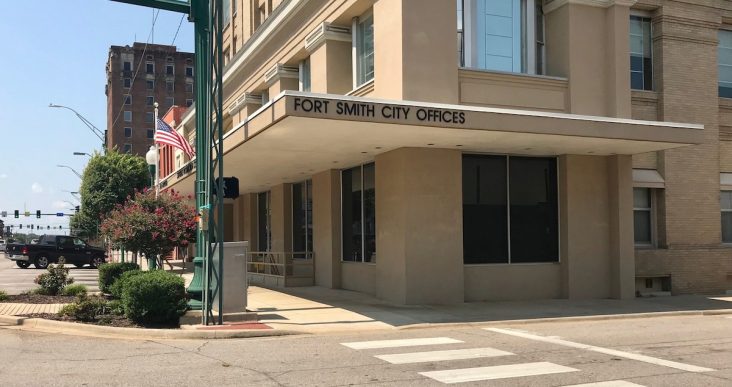FORT SMITH, Ark – Removing truck traffic from downtown Fort Smith has taken another turn. The Arkansas Department of Transportation (ArDoT) will look into the feasibility of second bridge to bring traffic into Fort Smith from Oklahoma in order to alleviate truck traffic on Garrison Avenue.
Fort Smith City Administrator Carl Geffken told the Fort Smith Board of Directors about the bridge idea during a Tuesday (Dec. 8) study session.
During discussion of alternate truck routes presented by Halff Associates of Little Rock, Geffken told the board of directors that city officials along with representatives of the city’s Central Business Improvement District, state representatives and other stakeholders met with Arkansas Highway Commissioner Keith Gibson of Fort Smith and ArDot Director Lorie Tudor Monday.
James Arbuckle, vice president of Halff Associates of Little Rock, presented an alternate downtown truck route to the Fort Smith Board of Directors Tuesday night that included a route suggested by Phil White, downtown business owner and member of the CBID board of commissioners, as well as alternate route that would take truck traffic off Garrison at Fifth Street and route it towards Kelley Highway. Arbuckle’s report suggested that in the next 12-18 months, the city look at signal phasing at Fifth Street and Garrison Avenue; pedestrian safety improvements at 11th Street and Garrison/Towson avenues; trailblazing (Wayfinding); updating the long range plan to reflect a new truck corridor; and begin a Fifth Street to Kelley Highway corridor study with a concept plan and intersection concepts.
The Fifth Street to Kelley Highway Alternative would use the existing Wheeler Avenue truck route south of Garrison Avenue. North of Garrison, it would follow Fifth Street to Fourth Street between A and B Streets and follow Fourth Street until it intersects with the future Kelley Highway. Truck traffic could then travel east along Kelley Highway to U.S. 71B tying to the existing truck route that connects to Interstate 540.
White’s proposed route limits the stops and number of turns for trucks on Garrison Ave. It starts at the west end of the avenue at the intersection of Second Street. The Phil White Route (PWR) would depart from Garrison Avenue and the Second Street intersection at a skew and head northeast to B Street, east to Fifth Street, then south to Garrison Avenue, continuing southward until it merges with Wheeler Ave.
The plan would also call for Garrison Avenue to go from a four-lane street to two lanes with medians down the middle of the avenue. It provides free flowing traffic to move between Second and Garrison and Fifth and Garrison intersections.
Director Kevin Settle said he would like to study the possibility of taking White’s plan even further and stop traffic on Garrison Avenue from a traffic signal just off the bridge at the intersection with Second Street. This would call for no traffic allowed on Garrison from Second Street to Fifth Street.
“Why don’t we look at some type of physical barrier? That area could be a walking pedestrian area,” Settle said. “There are plenty of cities that do that, just have a right or left turn only option at that signal. In Mobile, Ala., traffic comes out of the tunnel, and there is a hard right. We need to do something to get the trucks off Garrison.”
Geffken said the city was going to move forward with some of the short-term suggestions made by Arbuckle in 2021 but that the state also was working to come up with a bigger, long-term solution.
“This plan (Fifth Street to Kelley Highway plan) and Phil’s alternative plan have been a good driving force behind ArDoT wanting to look at our downtown issues related to trucks on Garrison and how we can adjust that and hopefully find a way to move trucks and provide hopefully even better access for our trucking community to get to their final destinations,” Geffken said.
He said ArDot would work with the Oklahoma Department of Transportation on a second bridge study. He said ArDot hired Arbuckle and Halff Associates as a consultant to work on the study of a second bridge into the city given the work the company has done on Fort Smith’s truck and downtown traffic study.
Arbuckle, project manager of the Fort Smith Downtown Traffic and Truck Study, and his team spent most of 2019 meeting with key players, looking at survey results and reviewing traffic studies in order to come up with viable solutions to the downtown traffic.
The Fort Smith Board of Directors passed a resolution in November 2018 that authorized an engineering services agreement with Halff Associates of Little Rock for the Fort Smith Downtown Traffic and Truck Study. The study, not to cost more than $151,986, is based on recommendations from the Propelling Downtown Forward Plan, which was adopted by the board in August 2017 as “a master plan addressing specific development and revitalization issues in the downtown and Central Business Improvement District (CBID) areas,” information on the study states.

